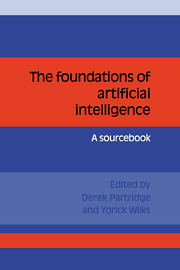Book contents
- Frontmatter
- Contents
- List of contributors
- Preface
- Acknowledgments
- 1 Introduction
- 2 The formal foundations of AI
- 3 Levels of theory
- 4 Programs and theories
- One small head: models and theories
- The nature of AI principles
- Artificial methodology meets philosophy
- 5 The role of representations
- 6 The role of programs in AI
- 7 Rational reconstruction as an AI methodology
- 8 Is AI special in regard to its methodology?
- 9 Does connectionism provide a new paradigm for AI?
- 10 The role of correctness in AI
- 11 Limitations on current AI technology
- 12 Annotated bibliography on the foundations of AI
- Index of names
Artificial methodology meets philosophy
Published online by Cambridge University Press: 03 May 2010
- Frontmatter
- Contents
- List of contributors
- Preface
- Acknowledgments
- 1 Introduction
- 2 The formal foundations of AI
- 3 Levels of theory
- 4 Programs and theories
- One small head: models and theories
- The nature of AI principles
- Artificial methodology meets philosophy
- 5 The role of representations
- 6 The role of programs in AI
- 7 Rational reconstruction as an AI methodology
- 8 Is AI special in regard to its methodology?
- 9 Does connectionism provide a new paradigm for AI?
- 10 The role of correctness in AI
- 11 Limitations on current AI technology
- 12 Annotated bibliography on the foundations of AI
- Index of names
Summary
Introduction
Philosophers constantly debate the nature of their discipline. These interminable debates frustrate even the most patient observer. Workers in AI also disagree, although not so frequently, about how to conduct their research. To equate programs with theories may offer a simple unifying tool to achieve agreement about the proper AI methodology. To construct a program becomes a way to construct a theory. When AI researchers need to justify their product as scientific, they can simply point to their successful programs. Unfortunately, methodological agreement does not come so easily in AI.
For a number of reasons, theorists in any discipline do not relish washing their proverbially dirty laundry in public. Methodology creates a great deal of that dirt, and philosophy of science supposedly supplies the soap to cleanse the discipline's methodology. Scientists often appeal to philosophers of science to develop methodological canons. It certainly does not instill confidence in a discipline if its practitioners cannot even agree on how to evaluate each other's work. Despite public images to the contrary, disagreements over how to approach a subject matter predominate in most scientific disciplines. Can philosophy of science come to the rescue of AI methodology? Yes and no.
Before describing the middle ground occupied by philosophy of science in its relationship to AI, we need to examine how some dismiss the AI research project altogether. In a previous article I argued against the various philosophical obstacles to the program/theory equation (Simon, 1979). I considered three types of objections to AI research: impossibility, ethical, and implausibility.
Information
- Type
- Chapter
- Information
- The Foundations of Artificial IntelligenceA Sourcebook, pp. 155 - 164Publisher: Cambridge University PressPrint publication year: 1990
Accessibility standard: Unknown
Why this information is here
This section outlines the accessibility features of this content - including support for screen readers, full keyboard navigation and high-contrast display options. This may not be relevant for you.Accessibility Information
- 1
- Cited by
